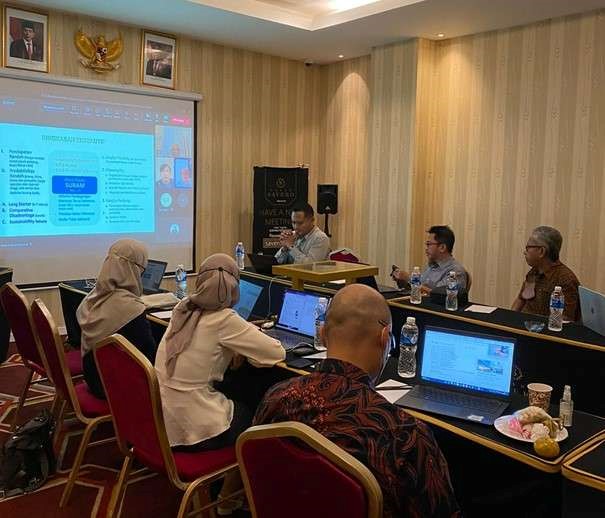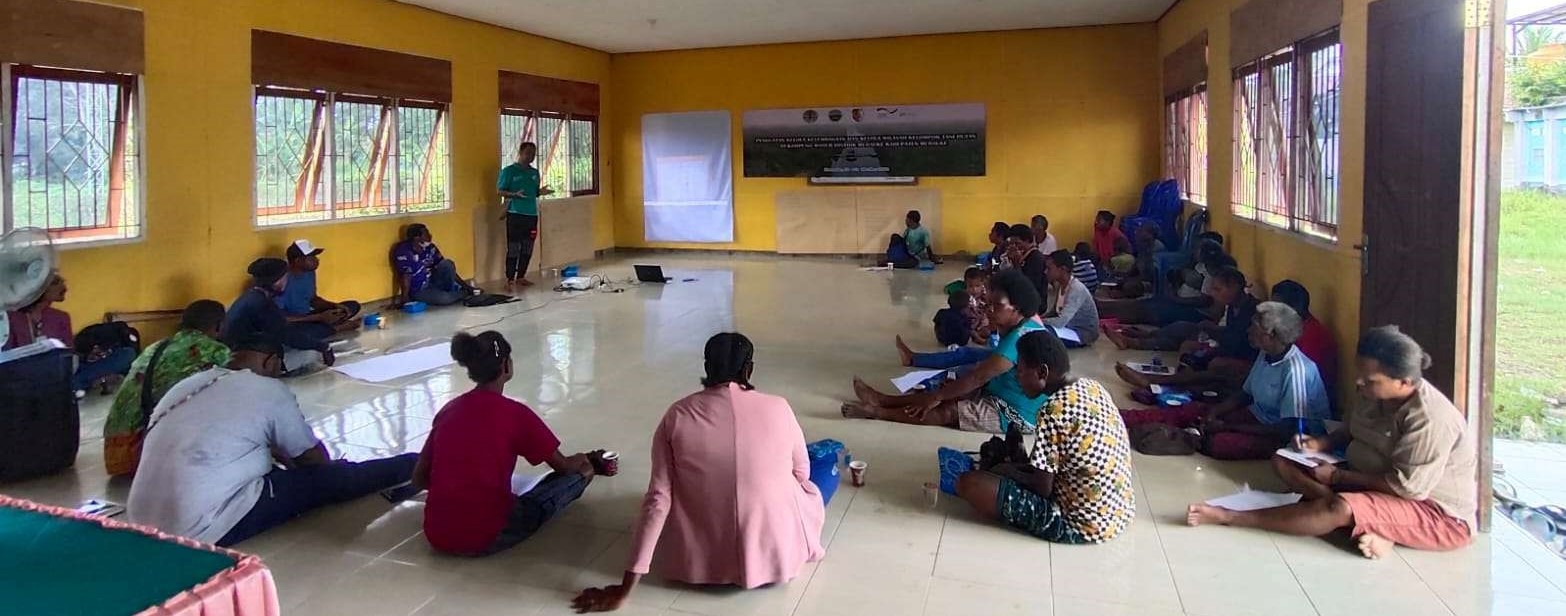FORCLIME
Forests and Climate Change ProgrammeTechnical Cooperation (TC Module)

Select your language

Continuing from initial discussions that addressed the study of forest bioeconomy in Indonesia, Bappenas recently held a series of FGDs aimed at securing views and input from stakeholders regarding bioeconomy potential. One of these discussions was held with industry players and specifically addressed the processing of forest products. FORCLIME facilitated this discussion with industry experts, which was held on 1 November 2022 in Bogor as well as online.
The meeting was opened by Dr. Nur Hygiawati Rahayu, ST, MSc, the Director of Forestry and Water Resources Conservation for Bappenas before continuing with a presentation given by a number of experts from the Bandung Institute of Technology, who introduced the underlying objectives and scope of the study. Speakers at this meeting included representatives from Perum Perhutani (a state-owned timber company), the Association of Indonesian Rubber Companies and PT Riau Andalan Pulp & Paper.
Several important points were made by the speakers in relation to the performance of the processing industry and the various commodities that it manages, including pine resin, eucalyptus, rubber and derivative products that are or that will be developed. Several key challenges were also addressed by the speakers, including a lack of competition between their products and imported raw materials, as well as the fact that their exports are less competitive than products from other countries. In terms of rubber specifically, 90% of rubber plantations remain dominated by smallholder plantations and, as a result of urgent need, farmers often do not want to endure the long wait required in terms of the planting of rubber plantations. This in turn leads to less productive plantations, a problem that is exacerbated by the low price of natural rubber which causes farmers to lean towards the development of other commodities. As a result, support from the government will be required to maintain the continuity of production from farmers.
One important message that emerged during the discussion and that will ultimately be followed up on is the importance of developing derivative products to boost the performance of the forest product industry and support bioeconomic development. In addition, it is necessary to identify the root cause of each commodity from upstream to downstream and viable solution strategies, as well as generate an analysis of the most profitable commodity through optimal processing from an economic standpoint. Product clustering is also vital in terms of determinations of potential product developments across each region of Indonesia, both on a small and large scale.
For more information, please contact:
Nurdita Rahmadani, Junior Advisor for Monitoring, Evaluation and Reporting
Pipin Permadi, Senior Advisor and Liaison Officer
Wandojo Siswanto, Strategic Area Manager for Forest Policy and Climate Change

Forest farmers’ groups in Wasur and Yanggandur Villages utilize and manage non-timber forest products (NTFPs) in traditional areas of the National Park of Wasur. To strengthen institutional and area management in each village, the Wasur National Park, supported by FORCLIME, has been conducting training sessions for members of these forest farmers’ groups with the goal that each group member should be able to understand their roles and responsibilities as regards support for NTFP management activities. The training sessions also offered knowledge relating to the establishment of communications between members so that group organization will be able to improve in the future. In addition, training participants also gained knowledge relating to group administration, specifically mutually agreed group rules and the distribution of business results.
Moreover, in terms of area management, participants were presented with knowledge relating to area management and the sustainable use of NTFPs. In addition, because they are active in the Wasur National Park area, the participants also received input relating to the zoning of the conservation area and the communities that engage in activities within the traditional zone. The training sessions also discussed the value of the local wisdom that can be applied during the management of areas. For example, the system that is used to open and close areas, which is known as Sasi, comprises a local legal system that contains various prohibitions and obligations relating to the picking or taking of potential natural resources of certain types during certain periods. Valuable local wisdom such as this can be applied as part of efforts to protect the Wasur National Park.
During the training sessions, participants practiced making a sketch map of the group's working area in relation to the products that they produce. Meanwhile, in terms of the sustainable use of natural resources, participants gained knowledge of sustainable use practices, such as rotating the sourcing of eucalyptus oil leaves, as well as the importance of not felling eucalyptus trees and not picking eucalyptus leaves from a single tree.
The capacity-building training for members of forest farmers’ groups of Yanggandur Village was held from 17 - 18 October 2022 at the Yanggandur Village Hall. Meanwhile, the training in Wasur Village was conducted from 20 - 21 October 2022 at the Wasur Village Hall.
As a follow-up to the training sessions, all forest farmers’ groups have been required to complete various organizational and administrative forms. In addition, each group also has to complete their management area sketch map.
For more information, please contact:
Theodora F. Resubun, Advisor for Sustainable Forest Management and Coordinator for Papua Province
Mohammad Sidiq, Strategic Area Manager for Sustainable Forest Management and Coordinator for Papua and West Papua Provinces
As part of its human resources capacity building efforts, the University of Ottow Geissler Papua, supported by FORCLIME, participated in a recent training session on Geographic Information Systems (GIS) and Mapping. This activity comprised basic level GIS training through the use of a free, open-source application known as QGIS. The training session was opened by the Dean of the Faculty of Agriculture, Forestry and Marine Affairs at the University of Ottow Geissler Papua, Ir. Simon H. Nenepath, M.Sc. and was held from 17 - 20 October 2022 at the University of Ottow Geissler Papua (UOGP) Campus in Jayapura, Papua Province. The resource personnel for this training session comprised FORCLIME advisors, specifically Remote Sensing/GIS and e-Learning Advisor, Danan P. Hadi, and Junior Advisor for GIS and Mapping, Ruben Yogi.
In general, the training session was organized to improve the knowledge and skill sets of lecturers and students regarding GIS and Mapping so as to support the development of the Center of Excellence for Geographic Information Systems and Mapping at the University of Ottow Geissler Papua (UOGP).
Since 2021 the University of Ottow Geissler Papua and FORCLIME have engaged in mutual synergy to encourage the establishment and development of the Center of Excellence for GIS and Mapping as a GIS service center and university-based mapping facility in Papua Province centered on the UOGP’s Faculty of Agriculture, Forestry and Marine Affairs. This Center of Excellence is expected to provide geospatial services to academia, local government, communities and the private sector in relation to spatial planning, forest management and biodiversity conservation.
“As a lecturer in Regional Economics, the training materials provided during the session were broadly applicable to map issues that relate to the regional economy,” explained Amsal Ilindamon, S.Sos, M.Sc., Lecturer at the Development Economics Study Program, Faculty of Economics and Business, University of Ottow Geissler Papua. “Hopefully, FORCLIME will be able to provide more in-depth training relating to the development of human resources through the UOG Papua campus,” he added.
This training session is set to be followed up with a session on advanced Geographic Information System Training.
For more information, please contact:
Danan P. Hadi, Advisor for Remote Sensing/GIS and eLearning
Ruben Yogi, Junior Advisor for GIS and Mapping
Edy Marbyanto, Strategic Area Manager for Human Capacity Development
 |
Supported By: |
  |